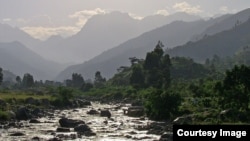A two-week expedition into western Uganda’s Ruwenzori Mountains - Africa's fabled Mountains of the Moon - will begin tomorrow to assess the effects of climate change on Africa’s vanishing glaciers and raise awareness of the advent of a looming global water crisis.
Scientists from several environmental and water conservation groups and the Makerere University Mountain Resource Centre in Uganda will make the climb. They are led by Luc Hardy, the founder of similar expeditions to the Arctic region, and guided by the French climber, David Rastouil.
The climb is called the Doomed Glaciers of Africa expedition.
"What is happening in the Ruwenzoris sheds light on the challenges we are facing globally from climate change and the world water crisis," Hardy said in a press release earlier this week.
“There is a series of glaciers located in the Ruwenzori Mountains in Uganda," said Paul Garwood, communications director for Green Cross International, "and it’s been shown that within about 100 years the glacial area has been reduced from 7.5 kilometers to less than one kilometer.” Green Cross is a non-profit organization in Geneva that was founded by Nobel Peace Laureate Mikhail Gorbachev. Green Cross is participating in the expedition.
“This is a result of climate change,” Garwood said.
Scientists believe climate change has led to the disappearance of mountain glaciers. They predict that the Ruwenzori’s glaciers - and sustainable water supplies - may be gone within two decades as this African glacier region continues to shrink.
“The purpose of this expedition is to record and survey the changes to the glacial region in western Uganda,” Garwood said.
They want to understand how fast the glaciers are receding, how the loss of glacier melt will effect local fauna - and most importantly - how the shrinkage is impacting water supplies for local residents.
“We’ve been receiving reports that even by the mid-2020’s the glaciers in those mountains could vanish,” said Garwood. “Without those glaciers in the area, of course, we remove a vital supply of fresh water that can be made available to that area - to people and the local vegetation.
“There’s a major concern for the environment if the glaciers do disappear,” said Garwood.
The scientific expedition will include young people from different organizations including the World Youth Parliament for Water. They will trek through jungle, following the paths of water courses, studying the areas the glaciers once covered.
Garwood pointed out that researchers also hope to develop the Mountain Resource Centre’s glacial monitoring capacities to help scientists and decision-makers understand the implications of climate change on the environment and on people.
The information obtained from this expedition will also be applied to other shrinking water supplies throughout the world.
Scientists from several environmental and water conservation groups and the Makerere University Mountain Resource Centre in Uganda will make the climb. They are led by Luc Hardy, the founder of similar expeditions to the Arctic region, and guided by the French climber, David Rastouil.
The climb is called the Doomed Glaciers of Africa expedition.
"What is happening in the Ruwenzoris sheds light on the challenges we are facing globally from climate change and the world water crisis," Hardy said in a press release earlier this week.
“There is a series of glaciers located in the Ruwenzori Mountains in Uganda," said Paul Garwood, communications director for Green Cross International, "and it’s been shown that within about 100 years the glacial area has been reduced from 7.5 kilometers to less than one kilometer.” Green Cross is a non-profit organization in Geneva that was founded by Nobel Peace Laureate Mikhail Gorbachev. Green Cross is participating in the expedition.
“This is a result of climate change,” Garwood said.
Scientists believe climate change has led to the disappearance of mountain glaciers. They predict that the Ruwenzori’s glaciers - and sustainable water supplies - may be gone within two decades as this African glacier region continues to shrink.
“The purpose of this expedition is to record and survey the changes to the glacial region in western Uganda,” Garwood said.
They want to understand how fast the glaciers are receding, how the loss of glacier melt will effect local fauna - and most importantly - how the shrinkage is impacting water supplies for local residents.
“We’ve been receiving reports that even by the mid-2020’s the glaciers in those mountains could vanish,” said Garwood. “Without those glaciers in the area, of course, we remove a vital supply of fresh water that can be made available to that area - to people and the local vegetation.
“There’s a major concern for the environment if the glaciers do disappear,” said Garwood.
The scientific expedition will include young people from different organizations including the World Youth Parliament for Water. They will trek through jungle, following the paths of water courses, studying the areas the glaciers once covered.
Garwood pointed out that researchers also hope to develop the Mountain Resource Centre’s glacial monitoring capacities to help scientists and decision-makers understand the implications of climate change on the environment and on people.
The information obtained from this expedition will also be applied to other shrinking water supplies throughout the world.





